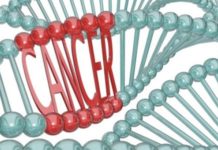Martha Gray has a long history of breast cancer in her family, so she knows that she needs to take her mammograms seriously every year. Her mother and aunt were both diagnosed with breast cancer in their early 40s, and Marth has just turned 50.
“I would ask every year, is there anything else I need to know, new research?” Martha recalls.
But what many women don’t know is that mammograms actually miss about 10 to 15 percent of breast cancers. They’re still the best option for yearly screening, but they’re not perfect. And in Martha’s case, they failed.

But after her mammogram came back clear, Martha, a teacher, still felt that something wasn’t right. She decided to take the Norton Cancer Institute’s high-risk assessment. She tested negative for genetic factors that could increase her cancer risk, but she also learned that she had very high odds of developing cancer based solely on her family history.

“To me, it was like the Holy Spirit. It could be your sixth sense. It could be that little voice, saying something’s not right.”
Based on the information from that assessment, Martha returned to her doctor to request more testing. She got an MRI and an ultrasound, followed by an MRI-guided biopsy, which is what ultimately picked up on a case of invasive lobular carcinoma in her left breast.

A week later, Martha learned that her initial mammogram and MRI had both missed a tumor in her right breast as well.
As it turns out, mammograms miss more cases of cancer than Martha realized. Here’s why mammograms don’t always catch tumors, according to Dr. Laila Agrawal.
“There can be some breast cancers that are too small to show up well on a mammogram or come up so fast that a woman may have had a normal mammogram a couple of months ago and then feels a mass herself which turns up to be breast cancer.”

It’s still extremely important to get regular breast checks and mammograms, but it’s also vital to advocate for yourself if you believe something may have been missed. You may be eligible for further screening, just like Martha was able to get.
Martha decided to get a double mastectomy to eliminate her cancer and drastically decrease the risk of it returning. She’s had to be away from her students while she recovers from surgery, but her students are more than ready for her to come back.
“They surprised me one day with a zoom where they were all wearing pink t-shirts,” she says. “I can’t tell you how lucky I feel.”

Check out the video below to learn more about Martha’s story.

Elizabeth Nelson is a wordsmith, an alumna of Aquinas College in Grand Rapids, a four-leaf-clover finder, and a grammar connoisseur. She has lived in west Michigan since age four but loves to travel to new (and old) places. In her free time, she. . . wait, what’s free time?
![]()
Provide Mammograms
Support those fighting Breast Cancer at The Breast Cancer Site for free! →
Whizzco Source






